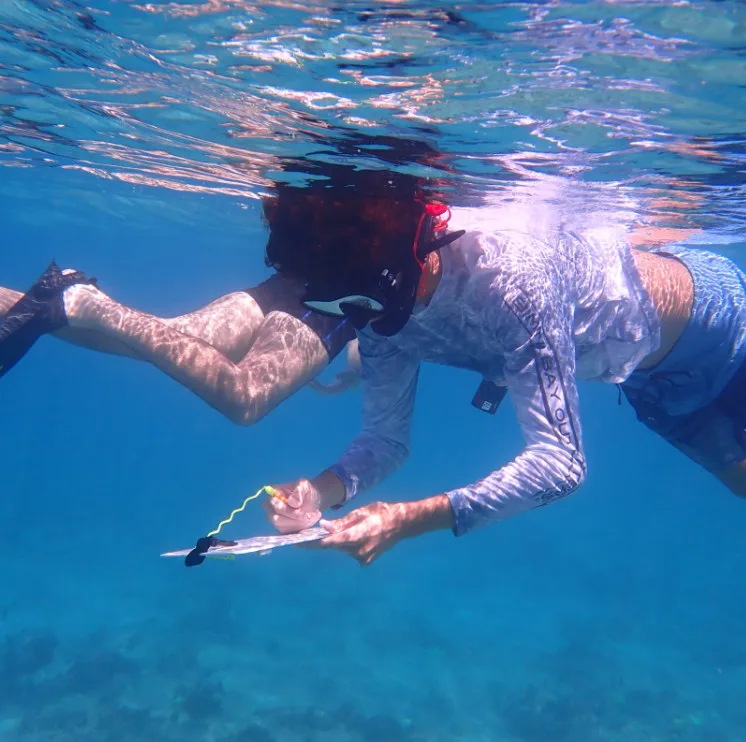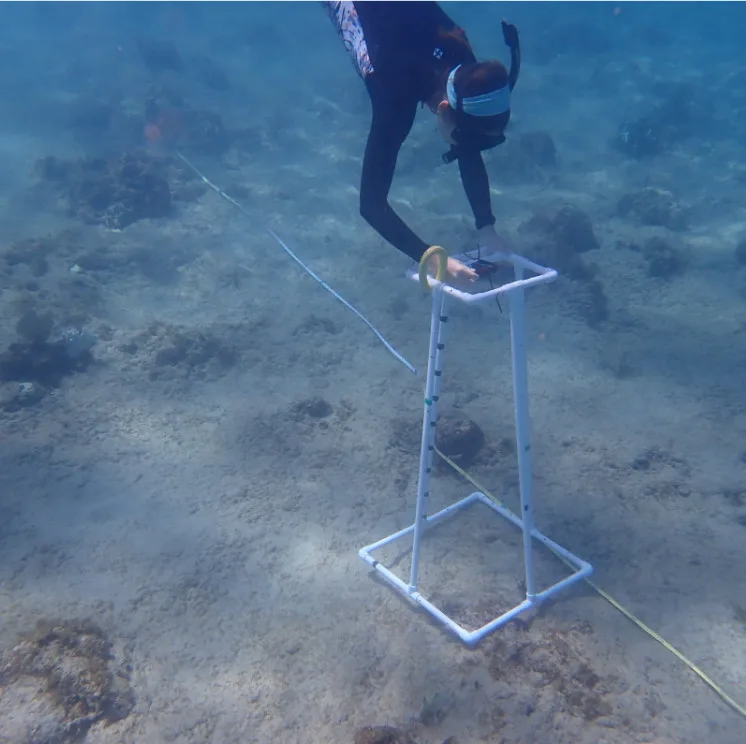Programs Blog
80,000 ft View

Date: 15 October 2024
Location: St Croix, United States Virgin Islands
Weather: Extremely hot and humid with light wind from the southeast
Two or three years ago, a few of my colleagues and I huddled around a bonfire at SEA’s campus in Woods Hole. We started a conversation about the potential for entirely shore-based ocean education programs at SEA. The coral reef programs sounded like an excellent candidate since many reefs can be accessed from the beach. Fast forward to today…we are finally implementing the program and collected our first set of scientific data! It has been so amazing to see the program unfold with such an incredible group of students.
My name is Dr. Heather Page, and I am one of the Program Directors. (Shout-out to my co-director, Dr. Craig Marin!) I joined SEA in 2019 as a full-time Oceanography faculty member who specializes in coral reefs. SEA attracted me because doing research and traveling abroad as a student were the most profound learning experiences of my academic career; I feel honored and humbled that I can help provide other students with similar learning experiences.
Each time we have snorkeled in St. Croix, it’s hard to ignore the signs of trouble on the reef. The water is toasty warm, resembling a hot tub more so than a refreshing pool. We are surrounded by stark white bleached corals; these corals, stressed by heat, have lost their algal symbionts that provide most of their energy for survival. Every single Siderastrea siderea coral is purple instead of their usual green-ish hue, another sign of temperature stress. Many corals that aren’t bleached are partially or completely dead from diseases. Pollution is scattered across the seafloor. The coral reefs are struggling to adapt to climate change and regional threats like pollution. With a loss of corals, comes a loss of the many goods and services they provide to the ocean and to humans.
So, what do we do? Coral reef conservation needs a combination of approaches across local, regional, and global scales. Restoration, protection, education, monitoring, research. When creating our research program, it started with conversations with local reef managers, scientists, and restoration practitioners. First, we listened. We learned about existing monitoring and research efforts at each island. We also learned which reefs they would like us to monitor and what type of data would be most useful for coral reef conservation. Then, we developed a research plan that would address their needs and build a robust long-term dataset of coral reef health. While this dataset “lives” at SEA, it will be shared with each of our local partners and will be available to anyone who requests the data. Students will have the opportunity to engage with many of our local partners who are leading coral reef conservation efforts in the Caribbean.
This fall, we will get a snapshot of how reefs are doing in St. Croix, Anguilla, Dominica, and Barbados. We use common snorkel-based research techniques to assess coral cover and health, fish and invertebrate communities, and water quality on reefs at each island. In the spring, we will do similar surveys at four different locations. This process will be repeated year after year. These annual snapshots (or surveys) over time will allow us to start exploring how reefs are changing in response to human impacts – both good and bad. How are reefs responding to climate change, pollution, and overfishing? On the flip side, how do marine protected areas and coral restoration affect the reef ecosystem? Stay tuned as we learn more throughout our research and connections to local communities!
I am sure you will hear all about our local field trips and snorkeling adventures through our blog. We collected our first set of data from Cane Bay, St. Croix today, so the research is off and running! And I am the best kind of exhausted after a full day of fresh, salty air and sunshine, so I am off to bed!
Best Fishes, Heather


Recent Posts from the Ships
- Ocean Classroom 2024-A collaborative high school program with Proctor Academy
- Collaborations and Long-term Commitments: SEA’s Caribbean Reef Program Sets a Course for Coastal Programs that Compliment Shipboard Experiences.
- Sea Education Association students prepare for life underway using state of the art nautical simulation from Wartsila Corporation.
- SEA Writer 2022, Magazines From the Summer SEA Quest Students
- Technology@SEA: Upgrades Allow Insight into Ocean Depths
Programs
- Gap Year
- Ocean Exploration
- High School
- Science at SEA
- SEA Expedition
- SEAScape
- Pre-College
- Proctor Ocean Classroom
- Protecting the Phoenix Islands
- SPICE
- Stanford@SEA
- Undergraduate
- Climate and Society
- Climate Change and Coastal Resilience
- Coral Reef Conservation
- Marine Biodiversity and Conservation
- MBL
- Ocean Exploration: Plastics
- Ocean Policy: Marine Protected Areas
- Oceans and Climate
- Pacific Reef Expedition
- The Global Ocean: Hawai'i
- The Global Ocean: New Zealand